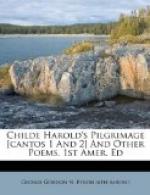III.
In my youth’s summer I did
sing of One,
The wandering outlaw of his own
dark mind;
Again I seize the theme, then but
begun,
And bear it with me, as the rushing
wind
Bears the cloud onwards: in
that tale I find
The furrows of long thought, and
dried-up tears,
Which, ebbing, leave a sterile track
behind,
O’er which all heavily the
journeying years
Plod the last sands of life—where not a
flower appears.
IV.
Since my young days of passion—joy,
or pain,
Perchance my heart and harp have
lost a string,
And both may jar: it may be,
that in vain
I would essay as I have sung to
sing.
Yet, though a dreary strain, to
this I cling,
So that it wean me from the weary
dream
Of selfish grief or gladness—so
it fling
Forgetfulness around me—it
shall seem
To me, though to none else, a not ungrateful theme.
V.
He who, grown aged in this world
of woe,
In deeds, not years, piercing the
depths of life,
So that no wonder waits him; nor
below
Can love or sorrow, fame, ambition,
strife,
Cut to his heart again with the
keen knife
Of silent, sharp endurance:
he can tell
Why thought seeks refuge in lone
caves, yet rife
With airy images, and shapes which
dwell
Still unimpaired, though old, in the soul’s
haunted cell.
VI.
’Tis to create, and in creating
live
A being more intense, that we endow
With form our fancy, gaining as
we give
The life we image, even as I do
now.
What am I? Nothing:
but not so art thou,
Soul of my thought! with whom I
traverse earth,
Invisible but gazing, as I glow
Mixed with thy spirit, blended with
thy birth,
And feeling still with thee in my crushed feelings’
dearth.
VII.
Yet must I think less wildly:
I have thought
Too long and darkly, till my brain
became,
In its own eddy boiling and o’erwrought,
A whirling gulf of phantasy and
flame:
And thus, untaught in youth my heart
to tame,
My springs of life were poisoned.
’Tis too late!
Yet am I changed; though still enough
the same
In strength to bear what time cannot
abate,
And feed on bitter fruits without accusing fate.
VIII.
Something too much of this:
but now ’tis past,
And the spell closes with its silent
seal.
Long-absent Harold reappears at
last;
He of the breast which fain no more
would feel,
Wrung with the wounds which kill
not, but ne’er heal;
Yet Time, who changes all, had altered
him
In soul and aspect as in age:
years steal
Fire from the mind as vigour from
the limb;
And life’s enchanted cup but sparkles near the
brim.




